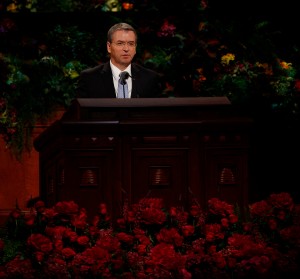
General authorities spoke in their native tongues this weekend at the 184th Semiannual General Conference of The Church of Jesus Christ of Latter-day Saints.
Four members of the Quorums of the Seventy used their first language within three conference sessions. Elder Chi Hong (Sam) Wong spoke in Cantonese; Elder Eduardo Gavarret spoke in Spanish; Elder Carlos A. Godoy spoke in Portuguese; and Elder Hugo E. Martinez spoke in Spanish.
A statement released last month announced the new option for general authorities to speak in their native languages during the conference sessions and how those talks would be broadcast to the public.
“Speakers at the general conference of The Church of Jesus Christ of Latter-day Saints whose primary language is not English now have the choice to deliver their talks in their native tongue,” said Dale Jones, a spokesman for the Church. “In those cases, English subtitles will be shown on screens in the Conference Center, and a live English interpretation will be provided for all other English-language broadcasts including satellite, cable, television, and the Internet.”
This announcement brought excitement to BYU campus, especially to the international students who hoped to hear their native languages spoken at general conference.
“When I first heard the announcement, I thought about President Uchtdorf maybe speaking in German,” said Julia Ditzer, a psychology major from Germany. “I think that would be really cool because he has a lot of charisma when he speaks, and I think especially for investigators it’s really nice because they get to see that it’s not only an American church but that there are international people in positions that are linked to the Church.”
Other students likewise voiced the opinion that the Church’s decision to allow general conference talks in foreign languages would help its international image.
“I think it’s a way for the Church to say, this is an international church,” said Gil Osuna, a business management major from Mexico City. While Osuna served his mission in Mexico, many of the members there related the Church to an American church and not an international church. This caused many of the members to have trouble connecting with the general authorities.
“Sometimes people didn’t feel that they connected with general authorities because it wasn’t their native language,” Osuna said. “But making that change, I think it was a smart move. I think it was a way to make a statement saying, we are an international church, and so we’re going to embrace that even though we are in Salt Lake City, Utah.”
While students were excited by the initial announcement, some were equally puzzlied as to how it would all work out. Sooryun Lee, a business management major from Pohang, Korea, worked as a contract translator in Korea before her mission translating the Ensign and Liahona magazines and CES and general conference talks. With her previous translation experience, she wasn’t sure what exactly to expect.
“When I first heard it, I was kind of confused,” Lee said. “Are they giving the talk at the conference center in their native language, and then how in the world will people in the Conference Center understand the language? How will they provide translation? General conference in Korea, they don’t do subtitles. If you watch general conference in another language, it’s all voice dubbed. There are no subtitles. That’s why I thought, what are they going to do? Are they going to do voice dubbing over radio and TV?”
The questions and concerns on how this would all work out were answered this weekend. In the Conference Center, subtitles were provided for those in attendance. Those watching and listening via satellite, television, Internet and radio heard a voice-dubbed version by translators.
Some international students watching general conference through media devices were looking forward to hearing the general authorities speak in their native languages but were disappointed by the fact that the talks were all voice dubbed. They were unable to hear their languages actually spoken.
“I was really exited to hear some general authorities speak their native language but was disappointed when I heard a translator speak for them,” Osuna said. “Especially in Elder Gavarret’s talk, since I speak Spanish. I just wanted my experience to be similar as being in the Conference Center: that is why I was disappointed to have a translator instead of the subtitles.”
President Uchtdorf stuck with English and his German accent, perhaps in consideration of the many Germans who speak English. Elder Jorg Klebingat of the Seventy also chose to speak English.
“I was a little bit disappointed that President Uchtdorf didn’t speak German, but I love his accent in English, so it wasn’t too bad,” Ditzer said. “His accent was actually really strong this time; it reminded me of home. It makes sense that both the Germans stuck to English, though, since it is kind of a prestige thing to speak English fluently in Germany.”
In spite of initial disappointment, some students realized no matter how individuals listened to the general authorities speak, the Spirit can speak to anyone, no matter what language is being spoken.
“I can testify that language cannot be a barrier to the Spirit unless you allow it to be,” Lee said. “The Holy Ghost can speak to anybody, and the Holy Ghost can speak any language.”




